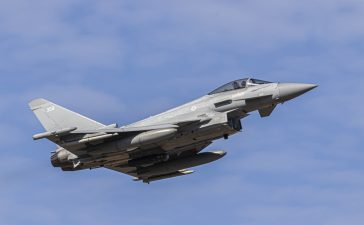
Technicians work on a Himars missile launcher chassis in Camden, Ark., Feb. 27, 2023.
Photo:
KEVIN LAMARQUE/REUTERS
The Biden administration recently released its conventional-arms transfer policy, which de-emphasizes the Trump administration’s focus on the economic benefit of weapons sales in favor of considering the buyers’ human-rights records. This is wise, given that American dominance of the global arms market means the economic benefits of a few additional sales pale in comparison to strategic advantages conferred by arms transfers. But the U.S. can’t—and shouldn’t—do it alone.
The war in Ukraine has adjusted geopolitical risk assessments and revealed the relative performance of Russian and Western weapons. This has accelerated an already existing trend in the global arms trade. Even before the war, U.S. market share had steadily grown to nearly 40%. Now the U.S. can’t build weapons fast enough to meet growing international demand in addition to its own.
Less appreciated is that North Atlantic Treaty Organization members and other American allies control much of the remaining market. That is, three quarters of the arms market is supplied by the U.S. or countries that depend on it for their security. Despite being kicked out of the F-35 program and having a healthy drone export portfolio, Turkey still seeks a consolation prize of American air power in the form of upgraded F-16s. South Korea has roared into the European arms market with billions in sales to Poland, but the 48 FA-50 fighter planes in its deal contain so much U.S. technology they can’t be exported without U.S. permission. Poland bought Korean rocket launchers because the U.S. can’t provide Himars quickly enough.
By comparison, the Organization of the Petroleum Exporting Countries Plus—of which Russia is a part—makes up roughly 60% of global oil exports. America rightly rails against OPEC’s market manipulation, but when it comes to weapons, the virtues of a competitive global market—higher quality at lower prices in greater numbers—don’t serve American interests.
America should lead a weapons cartel—not to maximize revenue but to advance its security agenda and deter market entry. This cartel’s goal would be to keep Russia down and China out, diminishing the influence these two adversaries gain through exports.
This would involve weaning major customers such as India off Russian weapons, but not necessarily in favor of American ones. Just as Saudi Arabia shows moderation relative to smaller oil producers, the U.S. must resist the temptation to win every potential arms contract at the expense of its allies. When it does manipulate the market, such as prohibiting South Korean fighter sales to Uzbekistan, the U.S. must make clear its decision is based on political rather than economic goals.
The U.S. should encourage its allies’ industries to compete among themselves to provide the somewhat less sophisticated but still vital products—especially munitions—currently in high demand by friendly countries.
While it may seem absurd to suggest that the world’s largest arms seller can also be restrained and liberal, this is in fact a prerequisite. Unlike other nations with defense industries, which depend on exports to survive, America can afford to say no.
A century of conventional-arms treaties has shown little success in limiting proliferation. Perhaps it’s time to try good old-fashioned monopolistic pricing.
Mr. Caverley is a professor of strategic and operational research at the U.S. Naval War College.
Copyright ©2022 Dow Jones & Company, Inc. All Rights Reserved. 87990cbe856818d5eddac44c7b1cdeb8
Appeared in the March 3, 2023, print edition.












